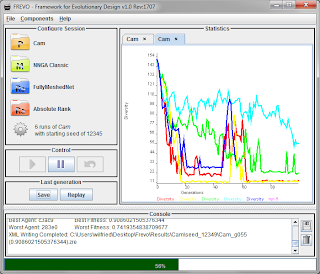The complex systems community explorer developed at ISC-PIF by Julian Bilke and David Chavalarias is doing exactly this. In particular, it visualizes data are taken from the complex systems registry directory. This directory is an open directory maintained by several complex systems organisations and coordinated by the Complex Systems Society. After registering your data and interests, you can explore other scholars graphically. Links symbolize how semantically close two researchers are. The more shared keywords match, the stronger the link.
Monday, September 16, 2013
The Complex Systems Community Explorer
If you are working in the field of complex systems, you face network analysis and graphical data representation. So why not use these features to organize your research network and to identify possible collaborators?
The complex systems community explorer developed at ISC-PIF by Julian Bilke and David Chavalarias is doing exactly this. In particular, it visualizes data are taken from the complex systems registry directory. This directory is an open directory maintained by several complex systems organisations and coordinated by the Complex Systems Society. After registering your data and interests, you can explore other scholars graphically. Links symbolize how semantically close two researchers are. The more shared keywords match, the stronger the link.
The complex systems community explorer developed at ISC-PIF by Julian Bilke and David Chavalarias is doing exactly this. In particular, it visualizes data are taken from the complex systems registry directory. This directory is an open directory maintained by several complex systems organisations and coordinated by the Complex Systems Society. After registering your data and interests, you can explore other scholars graphically. Links symbolize how semantically close two researchers are. The more shared keywords match, the stronger the link.
Monday, September 9, 2013
FREVO 1.0 released
We proudly announce the new release 1.0 of FREVO (FRamework for EVOlutionary design). FREVO helps to reduce the time to implement, set up and run an evolutionary
algorithm to evolve an agent's behavior as a solution to a particular
control problem. FREVO is decomposing the task into problem definition,
solution representation and the optimization method. These components allow to experiment with different combinations of algorithms and neural networks for different tasks.
The new version, FREVO 1.0, comes with 26 different components and an improved user interface which allows you to pause an evolution and check the intermediate results.
Quick start:
...or have a look at the following video explaining the basic steps to get started with FREVO:
The new version, FREVO 1.0, comes with 26 different components and an improved user interface which allows you to pause an evolution and check the intermediate results.
Quick start:
- download the newest version at frevo.sourceforge.net
- unpack the ZIP file
- unless you have it already on your system, install Java
- execute the createscrips.jar ("java -jar createscrips.jar")
- you can now run FREVO using the script named launch_Frevo
...or have a look at the following video explaining the basic steps to get started with FREVO:
For more information see the following sources:
- A. Sobe, I. Fehérvári, and W. Elmenreich. Frevo: A tool for evolving and evaluating self-organizing systems. In Proceedings of the 1st International Workshop on Evaluation for Self-Adaptive and Self-Organizing Systems, Lyon, France, September 2012.
- I. Fehérvári and W. Elmenreich. Evolving neural network controllers for a team of self-organizing robots. Journal of Robotics, 2010.
- The DEMESOS project www.demesos.tk
- Software used for the evolutionary algorithm: FREVO www.frevotool.tk
Subscribe to:
Comments (Atom)

